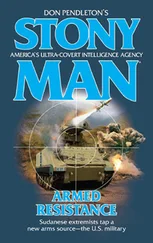He was a slight boy, Otto. Pale with deep black hair. Thin wrists. But strong enough to swing that machine gun, left and right, right and left. His physique made Albrecht aware again of the perverted nature of this war. That a boy as slim, as small, as birdlike as Otto could kill so many men. Halfway through that morning Albrecht had caught his face, motionless under his helmet, lit by the narrow slit in the bunker and dirty like today except for the white tributaries of tear marks mapping down his cheeks. By the evening these were covered with dirt too and he’d looked as he did now. Open eyes, unblinking. Impassive. Something inside him had broken, stretched, and snapped. One bullet in the thousands had been a bullet too far. Albrecht had seen it before, but never so cleanly. Never such a clean fracture of the soul. And never such a silent break either. Silent ever since. Sebald had looked him over and passed him fit, but no one had yet pushed him to speak. There was no need. They’d all seen what he’d done that day and they were all grateful for it; grateful he’d done it and grateful it was him who had, not them.
Albrecht took a last drag on the cigarette, studying Otto’s profile as he did so. He would take Otto. A strange choice perhaps, but for all his silence he’d proved himself an efficient soldier in the fighting since. And in the more intimate company of a patrol, it was just possible he might be nurtured back to voice. He’d passed his watershed, his own tidemark. He’d stepped through the looking glass and was therefore probably, despite his temporary muteness, more stable than many of the other privates who, as yet, appeared to be functioning normally.
So, Steiner, Sebald, Klepper, and Schütze Mann. Private Mann. Albrecht couldn’t help acknowledging to himself the appropriateness of the English translation. He flicked the cigarette stub from his fingers and ground it into the soil with the toe of his boot, like a dancer powdering the points of his shoes. Placing his hands on the fence before him he took a deep breath and then regretted it. The burnt rubber from the burning bicycle still hung in the air. The tail of the marching infantry was passing behind him. The slow ones. The blistered ones. The broken souls with broken soles.
Albrecht was looking for his final note. The note to set against Otto that would complete the melody of his patrol. The answer to Otto’s silence. That was how he would, once again, lift the pressure of his choice. How he would decide which man’s life he would alter. How he would choose whom he would save or sacrifice, depending on what this patrol held in store for them. A young private gave him his answer, provided the counterpoint as he hoped one of them would. He was sitting in a circle with others, resting against an upturned British ammo box, and as Albrecht’s eye passed over him, he laughed. And there, in that laugh, he made his own fate, decided his future. That laugh, as he took an offered cigarette from another soldier, was the note that met and answered the silence of Otto Mann.
The private’s name was Ehrhardt, Private Gernot Ehrhardt. Another replacement like Steiner. Just this morning Albrecht had seen him bayonet a British soldier as they took a gun position south of this village. The British soldier was old. Not old like Albrecht, but old like Albrecht’s father had been old. Grey hair, a rheumy eye. Ehrhardt had bayoneted him with force, with anger, in textbook style. And now here he was laughing. Was that any more cause for concern than Otto’s silent stare? Albrecht didn’t care. He’d seen Ehrhardt laugh before, many times since he’d joined the company, and he wanted him with them for that laugh. For that ability to prevent one side of his actions, his character, washing up against the rest of him.
Steiner, Sebald, Klepper, Mann, Ehrhardt.
Albrecht took out his notebook and pencil and wrote the names down in his clearest handwriting. Calling to one of the runners, he ordered him back to battalion headquarters to find these men’s records and to confirm battalion clearance for this request. In the meantime he’d get Alex to inform the men they’d been selected for a patrol. Once he had their records he’d find a motorbike to take him over to Southern Headquarters, where he hoped he’d discover exactly what choice he’d just made for them. Where they were going, for how long, and why. He also hoped he’d find out why he’d been chosen. Why an SS order to a Wehrmacht officer? Why a patrol when they were still only on the fringes of this country? He was a fluent English speaker. He’d studied here before the war, in Oxford and London. But whatever the reason for the patrol, it couldn’t be London, that’s what he told himself again. Not London, and therefore whatever their mission, it had to be good news for him and the men. Better news at least. Anywhere was better than London.
As if to confirm this thought another Panzer division came rumbling round the corner past the cottage accompanied again by more infantry. All of them were heading north, towards the capital. Albrecht turned and watched the sullen progression of the tanks once more. A dog, a scruffy Jack Russell, had appeared from somewhere. It leant back on its haunches and barked and snarled at the feet of the passing soldiers. One of them swung a lazy kick at its head and missed. Another, a few rows later, threw it the bitten end of a piece of salami. The dog snatched it from the air and lay down to chew on it, keeping one wary eye on the passing soldiers. French salami, bought just a few days ago, thrown to an English dog. Once again the speed of all this overtook Albrecht. The speed and momentum of this spiralling, unnatural world he had somehow found himself caught up in, like a man woken from a coma into a life no longer his.
“Of course they’ll be back. Don’t talk nonsense.”
Maggie spoke over her shoulder, still fussing with the kettle steaming from its spout on the front hob of her Rayburn. This was their third pot of tea. The other women murmured in agreement, nodding their heads at Mary, who sat at the end of the table, an anxious frown slanting over her eyes. Mary, who had finally said what they’d all been thinking. Maggie went back to the kettle, wrapping a cloth round its handle and lifting it in a smooth movement from the hob onto the sideboard. Just as William had got the first tractor in the valley so Maggie had got the first Rayburn, and she moved about it with the authority of a captain at the bridge of a ship. Sarah sipped at her tepid tea. One bird ticked away irregularly outside Maggie’s kitchen window like a one-finger typist taking the minutes of the day. It was left to Menna Probert, the other younger woman in the room, to break the silence.
“I don’t understand it. Jack’s got a whole field of mangels t’do this morning. He wouldn’t just leave that.”
Maggie glanced at Sarah. No, Menna didn’t understand, and Maggie was beginning to lose her patience. Bringing the pot of new tea to the table she sat down beside the younger woman, put her hand on her arm, and tried once more. And again all of them listened as Maggie attempted to explain the impossible to Menna, as she tried to paint a picture of an altered world sitting there in her kitchen that looked so familiar, so unchanged and unchangeable that it challenged every word she spoke.

When Sarah had got back from looking for Tom on the hill, she’d found Maggie waiting for her in the cobblestoned yard. The dogs had got to her first and were sniffing round her legs. Maggie ruffled their heads, shielding her eyes with one hand as she looked up at Sarah.
“Hello, Maggie,” Sarah had said, trying to sound as natural as possible but still unable to prevent her relief at seeing Maggie tinge her greeting.
Читать дальше













